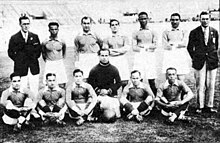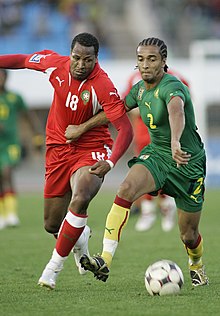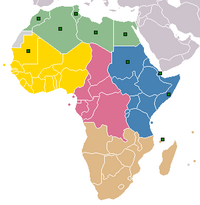Portal:Football in Africa
Introduction
Football is the most popular sport in Africa, alongside basketball. Indeed, football is probably the most popular sport in every African country, although rugby and cricket are also very popular in South Africa. The first football stadium to be built in Africa was the Alexandria Stadium in 1929.
The English Premier League is the most popular sports league in Africa. The most popular clubs in Africa are Arsenal, Chelsea and Manchester United. (Full article...)
This section may be unbalanced toward certain viewpoints. (October 2022) |

Selected article -
Founded on 5 January 1911 as Qasr El Nile Club, the club has traditionally worn a white home kit since its inception. The club's name was changed two years later to Cairo International Sports Club (Zamalek), colloquially El Qāhirah El Mokhtalat Club or El Mokhtalat Club. The club is credited to be the only Egyptian club to participate in the Sultan Hussein Cup as a sign of resistance to the British presence in Egypt and a way to display the Egyptian presence in the sport. Zamalek reached the final of the first edition in 1917 and this encouraged other Egyptian clubs to participate. In 1941, the club was granted the honorific title after Farouk I and became officially known as Farouk El Awal Club (transl. Farouk I Club), however, since the 1910s, Zamalek was the club's unofficial name and it became official after the 1952 Egyptian Revolution.
Domestically, Zamalek established itself as one of the two major forces in Egyptian football during the 1920s, as it is the first Egyptian team to ever win a title. Zamalek was the first Egyptian team to win Sultan Hussein Cup in 1921, and the first team to win the Egypt Cup in 1922; and the first team to win the Cairo League in 1922–23. In domestic football, the club has won 65 trophies; 14 Egyptian Premier League titles, 28 Egypt Cup titles, 4 Egyptian Super Cup titles, 14 Cairo League titles, 2 Sultan Hussein Cup titles, and a record of one title for each of the October League Cup, Egyptian Friendship Cup and Egyptian Confederation Cup. It is one of two clubs that have played in every season of the Egyptian Premier League, and one of seven that have never been relegated to the Egyptian Second Division.
Selected biography -
Lemina began his career in France with the Lorient youth academy at the age of 11; he was later promoted to the first team during the 2012–13 season, his only season with the club. The following season, he joined Marseille for €4 million, although he initially struggled to gain playing time in his first year with the club, making only eight league starts during the 2013–14 season. He began to be used more frequently by manager Marcelo Bielsa during the 2014–15 season, making his breakthrough with the club as he helped the team to a fourth-place finish. On 31 August 2015,Juventus announced the signing of Lemina on a season-long loan for €500,000 with an option to buy for €9.5 million at the end of the 2015–16 season, in which he helped his team achieve a domestic double. His loan was made permanent in April 2016. On 8 August 2017, Lemina joined Southampton on a five-year deal for a club record fee of £15.4 million.
Lemina represented France at under-20 and under-21 level, winning the 2013 FIFA U-20 World Cup before opting to represent Gabon at senior level in June 2015. He scored on his international debut in a 3–3 friendly draw against Tunisia on 9 October 2015.
Selected image -
 |
Boys playing street football in Egypt
Subcategories
Related portals
More sports portals
WikiProjects
Related task forces and sub-projects
African football task force
WikiProject Africa • WikiProject Football
WikiProject Football task forces and sub-projects
 | |
| Wikipedia ads | file info – #250 |
Topics
Open tasks

- Expand stubs: Competitions in Africa • Organizations
- Expand club articles of teams from Africa.
- Expand biographies of Africans involved in football.
- Create: Requested articles • Most wanted football articles • Requested general football articles
- Add: Infoboxes • Images (General requests, Requested images of people)
- Review: articles currently under review
- Assess: Assessment requests • Assess an article
- Revert vandalism on this portal and on African football articles
- Assist in maintaining this portal and keeping its selected content up to date.
- WikiNews: Create and submit news stories about African football for Wikipedia's sister project WikiNews.
Associated Wikimedia
The following Wikimedia Foundation sister projects provide more on this subject:
-
Commons
Free media repository -
Wikibooks
Free textbooks and manuals -
Wikidata
Free knowledge base -
Wikinews
Free-content news -
Wikiquote
Collection of quotations -
Wikisource
Free-content library -
Wikiversity
Free learning tools -
Wiktionary
Dictionary and thesaurus
More portals
Sources

- ^ "The History Of Soccer In Africa". NPR.org. 2010-06-09. Retrieved 2016-03-31.
- ^ a b c Alegi, Peter (2010). African Soccerscapes. Ohio University Press. pp. 1–2. ISBN 9780896802780.
- ^ Frimpong, Enoch Darfah. "Ghana news: A world of superstition, frustration and disillusionment - Graphic Online". Retrieved 23 September 2017.
- ^ Lacey, Marc (8 August 2002). "Kangemi Journal; For Spellbinding Soccer, the Juju Man's on the Ball". The New York Times. NY Times. Retrieved 2016-03-31.
- ^ "World Cup Witchcraft: Africa Teams Turn to Magic for Aid". National Geographic. Archived from the original on July 10, 2006. Retrieved 2016-03-31.
- ^ Andy Mitten (September 2010). The Rough Guide to Cult Football. Rough Guides UK. ISBN 9781405387965. Retrieved 2016-04-02.
- ^ "African Nations Cup overshadowed by hocus pocus | Football". The Guardian. Retrieved 2016-04-09.
- ^ Kuper, Simon (2006). Soccer Against the Enemy: How the World's Most Popular Sport Starts and Stops Wars, Fuels Revolutions, and Keeps Dictators in Power. Nation Books. p. 123. ISBN 978-1-56025-878-0.


























